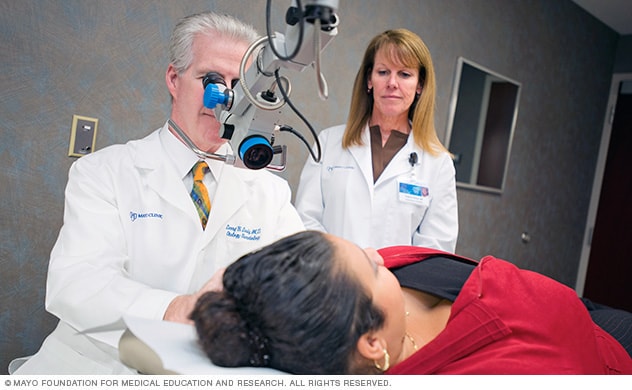Discovering the Field of Otolaryngology: What to Expect When You Seek Advice From an ENT
Otolaryngology, commonly described as ENT, incorporates the diagnosis and treatment of ear, throat, and nose disorders. For those experiencing relevant problems, seeking advice from an ENT expert can offer clarity and alleviation. Comprehending what to anticipate during such assessments is vital for effective interaction and care. This introduction will lay out crucial aspects of the ENT experience, consisting of typical reasons for sees and the procedures entailed in medical diagnosis and treatment.

Comprehending Otolaryngology: An Overview
Otolaryngology, commonly referred to as ENT (Nose, ear, and throat) medicine, is a customized branch of medicine that concentrates on the medical diagnosis and treatment of problems impacting these crucial areas of the body. This field encompasses a large range of problems, consisting of those associated to hearing, balance, respiratory system function, and speech. Otolaryngologists are educated to take care of both medical and surgical treatments, using advanced methods and technologies. Their know-how expands beyond typical ailments, addressing problems such as allergic reactions, sinus infections, and hearing loss. Furthermore, they play an important role in the management of head and neck cancers cells, giving thorough treatment tailored to private patient needs. Overall, otolaryngology stays necessary for preserving health and wellness and top quality of life in affected people.
Typical Reasons to See an ENT Specialist
Many people seek the know-how of an ENT expert for a selection of reasons, reflecting the diverse nature of problems that impact the ear, throat, and nose. Usual concerns include chronic sinus problems, which typically results in relentless nasal congestion and facial discomfort. Allergic reactions and their connected signs and symptoms, such as itching and sneezing, additionally prompt visits to these experts (Otolaryngology). Hearing loss, whether unexpected or steady, is an additional significant reason for consultation. On top of that, individuals might seek examination for throat problems, including consistent hoarseness or ingesting troubles. Sleep apnea, defined by disrupted breathing during rest, is often dealt with by ENT specialists too. Each of these conditions highlights the relevance of specialized care in handling complex ENT-related health issues
Getting ready for Your ENT Appointment
When preparing for an ENT visit, it is essential to gather relevant information and think about any kind of specific issues. Individuals should compile a detailed case history, consisting of previous ear, nose, or throat issues, surgical procedures, and current drugs. Recording signs-- such as duration, regularity, and extent-- can supply useful insights for the ENT specialist. Furthermore, individuals need to prepare a list of questions they wish to ask, guaranteeing that all concerns are attended to throughout the browse through. Bringing along any type of relevant medical documents or test results can further aid the ENT in recognizing the person's problem. Patients need to validate their appointment details, including date, time, and place, to decrease any last-minute complication. Correct preparation can boost the performance of the assessment and result in much better results.
What to Anticipate Throughout the Appointment
As the consultation begins, the client can anticipate to involve in a comprehensive discussion with the ENT specialist about their signs and case history. The professional will ask concerning the duration, regularity, and seriousness of signs and symptoms such as hearing loss, nasal congestion, or aching throat. In addition, the individual's previous clinical problems, drugs, and any type of pertinent household history will be assessed, assisting the professional in creating a total understanding of the client's wellness. The ENT might likewise inquire about way of living variables, such as exposure to irritants or toxic irritants. This open discussion develops a foundation for the appointment, making certain that the person's worries are dealt with and setting the phase for any type of needed assessments or suggestions for treatment.
Analysis Examinations and Treatments in Otolaryngology
A variety of diagnostic examinations and procedures are important in otolaryngology to properly evaluate and detect conditions impacting the throat, nose, and ear. Usual examinations include audiometry, which determines hearing function, and tympanometry, examining center ear stress. Nasal endoscopy enables visualization of the nasal flows and sinuses, while laryngoscopy examines the throat and singing cables. Imaging techniques, such as CT scans and MRIs, give in-depth views of head and click to read neck frameworks. Allergy testing may also be carried out to recognize triggers for sinus or respiratory concerns. These analysis devices make it possible for ENT professionals to create a detailed understanding of patients' problems, ensuring customized and reliable monitoring strategies. Proper diagnosis is vital for successful treatment end results in otolaryngology.
Treatment Choices Offered by ENT Specialists
ENT specialists offer a variety of treatment options tailored to resolve details problems influencing the ear, nose, and throat. These treatments range from conservative strategies, such as medication and way of living alterations, to even more invasive procedures. For instance, allergies may be taken care of with antihistamines or immunotherapy, while persistent sinusitis could call for nasal corticosteroids or sinus surgical procedure. For hearing loss, ENT specialists commonly suggest listening devices or medical interventions like cochlear implants. In cases of throat disorders, alternatives can consist of speech therapy or operations to get rid of obstructions. Furthermore, they may provide guidance for managing rest apnea, including the usage of CPAP tools or surgical treatments. Generally, the goal is to boost clients' lifestyle via individualized treatment and effective therapy approaches.
When to Look For Follow-Up Treatment With an ENT
When to look for follow-up treatment with an ENT professional is crucial for taking care of continuous symptoms or complications associated to ear, nose, and throat conditions, identifying. Clients need to think about setting up a follow-up visit if signs and symptoms persist regardless of preliminary treatment, such as chronic ear discomfort, nasal blockage, or throat discomfort. Adjustments in hearing, balance issues, or unusual nasal discharge might also require additional examination. Additionally, if a client experiences negative effects from suggested drugs or has actually undertaken a medical treatment, follow-up care is very important to check recovery and attend to any type of worries. Timely assessments can ensure efficient monitoring of conditions, avoid potential difficulties, and provide assurance regarding one's wellness. Looking for follow-up care advertises positive health management in otolaryngology.
Frequently Asked Questions

What Credentials Should I Look for in an ENT Professional?
When looking for an ENT expert, one should look for board certification, relevant experience, and solid client evaluations. see this Furthermore, effective interaction abilities and a caring approach can significantly enhance the total therapy experience.
How Do I Choose the Right ENT for My Needs?
Picking the ideal ENT expert involves examining their credentials, experience, and person testimonials (Hearing). It is important to ponder their communication style and approach to therapy, ensuring they line up with the individual's details health and wellness requirements and preferences
Exist Any Risks Related To ENT Procedures?
The threats related to ENT treatments might consist of infection, blood loss, anesthesia issues, and prospective damage to surrounding frameworks. Patients must go over these risks with their doctor to understand individual issues and assurance informed choices.
Exactly How Can I Manage Anxiousness Before My ENT Appointment?
To manage anxiety prior to an appointment, individuals can exercise deep breathing workouts, visualize positive outcomes, prepare inquiries in advance, visit homepage and look for assistance from buddies or household, fostering a sense of peace of mind and peace.
What Should I Do if I Experience Adverse Effects From Treatment?
If negative effects from therapy take place, the person must promptly report them to their doctor. Adjustments to treatment or extra treatments may be necessary to assure safety and efficiency in managing their problem - Otolaryngologist. As the examination begins, the person can expect to engage in an extensive discussion with the ENT specialist about their symptoms and medical history. These diagnostic tools enable ENT specialists to establish a detailed understanding of clients' conditions, guaranteeing tailored and efficient administration plans. ENT professionals supply a variety of treatment alternatives customized to resolve specific conditions impacting the nose, ear, and throat. When seeking an ENT specialist, one must look for board accreditation, relevant experience, and solid individual evaluations. Choosing the appropriate ENT professional includes assessing their certifications, experience, and person testimonials
Comments on “Tinnitus or Sound Sensitivity? Here's When to Seek Help from a Hearing Expert”